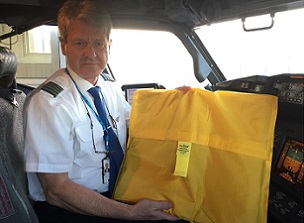 The moment a lithium battery explodes at house in Halifax, West Yorkshire
The moment a lithium battery explodes at house in Halifax, West Yorkshire
 The last place you’d want a lithium battery fire is in the confined space of a passenger aircraft
The last place you’d want a lithium battery fire is in the confined space of a passenger aircraft
 A pilot with an AvSax lithium fire mitigation bag
A pilot with an AvSax lithium fire mitigation bag
It’s one of the most frightening fire videos ever seen and shows the power and explosive intensity of a lithium battery fire.
The incident involving a motorbike lithium battery happened at a house in Halifax, West Yorkshire, and left the home badly damaged.
The shocking video shows the owner running downstairs in the middle of the night after being woken by a popping noise which had been caused by the batteries of an electric motorbike being charged inside the house.
The batteries had gone into what’s known as thermal runaway which happens when one cell in a battery overheats it can produce enough heat – up to 900°C (1652°F) – to cause adjacent cells to overheat. This can cause a lithium battery fire to overheat, produce spirals of smoke and then to flare repeatedly.
But this battery just explodes, wrecking the kitchen and damaging the rest of the house.
Watch manager John Cavalier from West Yorkshire Fire and Rescue’s fire investigation unit, said: “While fires involving lithium batteries are common, having a video showing the violence of the fire’s development is not. It’s clear to see in the video that the fire is absolutely horrifying – none of us would want this to happen in our homes.”
The fire happened in a house in the Illingworth area of Halifax – the town made famous by gritty police drama Happy Valley - at about 1am on February 24, 2023, and five people were taken to hospital. All had smoke inhalation with one suffering burns to their mouth and windpipe. None of the injuries were life threatening.
Watch Manager Cavalier added: “Because lithium batteries can be found in a range of items we frequently attend fires involving them. They can be found in cars, bikes, scooters, laptops, phones and e-cigarettes among many other items.
“Any other type of fire we deal with has usually developed slowly and people are able to get out quickly. However, battery fires are so ferocious and spread so quickly there isn’t as much time to escape.”
The last place you’d want such a fire is in the confined space of a passenger aircraft but fires involving laptops, mobile phones, power packs and even headphones and vapes do happen on board at 35,000ft.
This is why all personal electronic devices containing lithium batteries must be carried in hand luggage and NEVER in the hold as the automatic fire suppression systems there would struggle to deal with fires of such ferocity.
This is why many airlines carry lithium battery fire mitigation bags on board with the crew trained how to use them in an emergency.
Coincidentally, the company which produces most of the lithium battery fire containment bags for the airline industry, Environmental Defence Systems Ltd, is based just 10 miles from the scene of the Halifax house fire in Huddersfield, West Yorkshire.
They invented the world’s best-selling lithium battery fire mitigation bag, the AvSax, which is now on board around 16,750 aircraft operated by more than 100 airline companies worldwide. AvSax have been deployed in action at least 33 times on board aircraft since 2017 and on every occasion the aircraft was able to continue safely to its destination with no need to divert or make an emergency landing.
Here is West Yorkshire Fire and Rescue Service’s lithium battery safety advice: